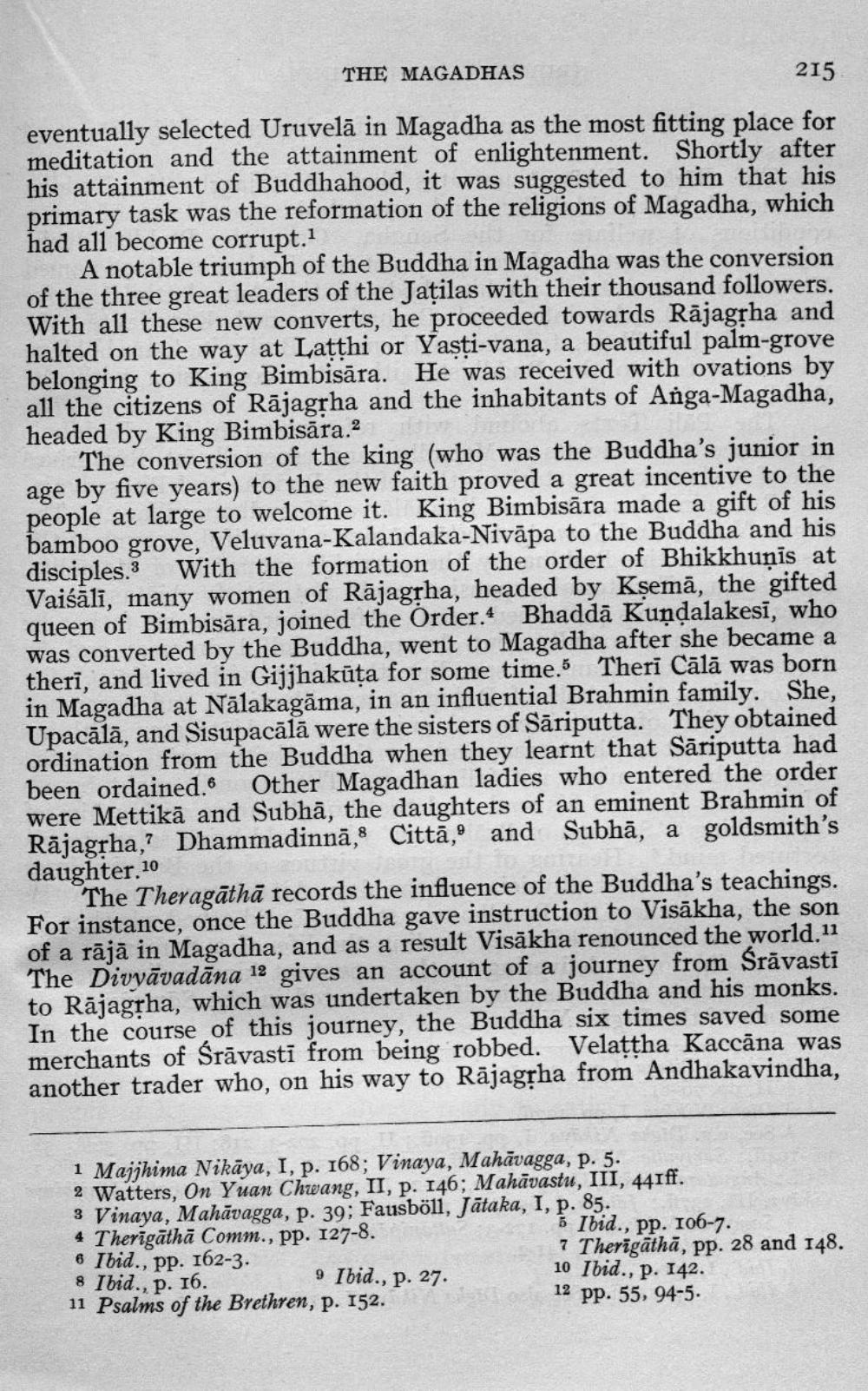________________
THE MAGADHAS
215 eventually selected Uruvelā in Magadha as the most fitting place for meditation and the attainment of enlightenment. Shortly after his attainment of Buddhahood, it was suggested to him that his primary task was the reformation of the religions of Magadha, which had all become corrupt.1
A notable triumph of the Buddha in Magadha was the conversion of the three great leaders of the Jațilas with their thousand followers. With all these new converts, he proceeded towards Rājagặha and halted on the way at Laţthi or Yasti-vana, a beautiful palm-grove belonging to King Bimbisāra. He was received with ovations by all the citizens of Rājagrha and the inhabitants of Anga-Magadha, headed by King Bimbisāra.2
The conversion of the king (who was the Buddha's junior in age by five years) to the new faith proved a great incentive to the people at large to welcome it. King Bimbisāra made a gift of his bamboo grove, Veluvana-Kalandaka-Nivāpa to the Buddha and his disciples. With the formation of the order of Bhikkhuņis at Vaiśāli, many women of Rājagrha, headed by Kșemā, the gifted queen of Bimbisāra, joined the Order.4 Bhaddā Kundalakesi, who was converted by the Buddha, went to Magadha after she became a therī, and lived in Gijjhakūta for some time. Theri Cālā was born in Magadha at Nālakagāma, in an influential Brahmin family. She, Upacālā, and Sisupacālā were the sisters of Sāriputta. They obtained ordination from the Buddha when they learnt that Sāriputta had been ordained. Other Magadhan ladies who entered the order were Mettikā and Subhā, the daughters of an eminent Brahmin of Rājagrha,? Dhammadinnā,8 Cittă,and Subhā, a goldsmith's daughter. 10 - The Theragāthā records the influence of the Buddha's teachings. For instance, once the Buddha gave instruction to Visākha, the son of a rājā in Magadha, and as a result Visākha renounced the world. 11 The Divyāvadāna 12 gives an account of a journey from Srāvasti to Rājagrha, which was undertaken by the Buddha and his monks. In the course of this journey, the Buddha six times saved some merchants of Śrāvasti from being robbed. Velattha Kaccāna was another trader who, on his way to Rājagrha from Andhakavindha,
1 Majjhima Nikaya, I, p. 168; Vinaya, Mahāvagga, P. 5. 2 Watters, On Yuan Chwang, II, p. 146; Mahāvastu, III, 441ff. 3 Vinaya, Mahāvagga, p. 39; Fausböll, Jataka, I, p. 85. 4 Therīgāthā Comm., pp. 127-8.
5 Ibid., pp. 106-7. 6 Ibid., pp. 162-3.
7 Therīgāthā, pp. 28 and 148. 8 Ibid., p. 16. 9 Ibid., p. 27.
10 Ibid., p. 142. 11 Psalms of the Brethren, p. 152.
12 pp. 55, 94-5.




